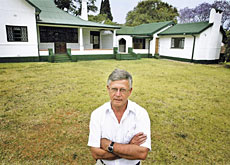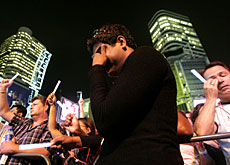Swiss Aids expert is European of the Year

Ruedi Lüthy, a Swiss doctor who cares for HIV/Aids patients in Zimbabwe, tells swissinfo about being voted "2007 European of the Year" by Reader's Digest magazine.
Swiss President Micheline Calmy-Rey presented Lüthy with his award at Zurich University on Thursday.
Calmy-Rey said Lüthy “demonstrated without tiring what is possible in the most desperate situations and how things that are essential for survival can be done”.
After 20 years combating the HIV/Aids pandemic in Switzerland, during which time he founded the Zurich Lighthouse hospice for terminally ill patients, Lüthy moved to Zimbabwe in 2003 to set up a clinic that has helped more than 1,300 people suffering from HIV/Aids.
The 65-year-old Zurich professor of infectious diseases was nominated by 20 European Reader’s Digest editors.
swissinfo: How does it feel to be named European of the Year 2007 by Reader’s Digest?
Ruedi Lüthy: It’s an honour, but initially I didn’t quite understand why I had received a European award as a Swiss who lives in Zimbabwe. It’s quite an unusual combination.
It’s also an incredible honour to be receiving the award from Micheline Calmy-Rey, especially as she is foreign minister and has a very special connection with the humanitarian work of our team in Harare.
swissinfo: What was the motivation behind your decision to leave Switzerland to work in Zimbabwe?
R.L.: It was a fairly logical choice as HIV is ravaging developing nations, especially in sub-Saharan Africa.
Although huge progress has been made since 1996 via triple combination therapy, which almost gives Aids patients “normal” life expectancy, this has not happened in developing countries, where prevention efforts have failed to gain government attention and HIV has exploded.
When I realised that we had achieved what we needed to do in Europe and the United States, I decided to turn somewhere else.
swissinfo: Why did you choose Zimbabwe in particular?
R.L.: It was accidental. In 2002 I met a doctor from Zimbabwe at an Aids conference who wanted advice on how to carry out a clinical study using multivitamins and aspirins.
My feeling was that it was unethical, but she told me they were the only things available. Two months later I went to look for myself and saw that the situation was far worse than I had imagined, although I’d been to Africa several times before.
swissinfo: What kind of project does your foundation Swiss Aids Care International support in Zimbabwe?
R.L.: Our project in Harare is a very simple one: we have set up a free outpatient clinic for HIV patients who are too poor to afford healthcare.
swissinfo: What is your view on the HIV/Aids pandemic seen from the perspective of a developing country, such as Zimbabwe?
R.L.: It’s devastating – a humanitarian catastrophe. I don’t think I have words to properly describe it.
There are more than one million orphans living in Zimbabwe who have lost their parents to HIV and grow up under very difficult conditions, without schooling, food or proper shelter. And the situation is aggravated by Zimbabwe’s political isolation.
At the moment it’s difficult to see much hope as the economy is really sliding, with inflation averaging 100 per cent and 80 per cent unemployment; everything is disintegrating, especially schools and public transport.
And as in neighbouring countries South Africa or Mozambique where HIV is just as prevalent, it’s destroying at least one if not two generations.
swissinfo: Despite the gloomy picture you paint, are there any glimmers of hope as a result of your work?
R.L.: The immediate effects of antiretroviral therapy are incredible. Some people, especially those not too familiar with medicine, consider the effects to be miraculous. They feel they have been given a second life; that is the hope that keeps us all going. Without that it would be a really traumatising experience that no one would be able to bear for long.
swissinfo-interview: Simon Bradley
Professor Ruedi Lüthy was born on February 17, 1941 and is married with three children.
Lüthy trained as a doctor and became head of infectious diseases at Zurich University Hospital.
At the beginning of the 1980s, he became one of the first Swiss experts on HIV/Aids. In 1992 he founded the Zurich Lighthouse, a 21-bed hospice providing terminal life care for HIV/Aids patients.
Lüthy founded Swiss Aids Care International in 2003, a Swiss foundation that set up an outpatient clinic in Harare, Zimbabwe for HIV patients who are too poor to afford healthcare. Since it opened in 2004, the clinic has treated over 1,300 patients.
There are more than 38 million people living with HIV around the world.
2.8 million people with HIV/Aids died in 2005, most of them in sub-Saharan Africa where food supplies are scarce and health systems are weak.
65 million people worldwide have contracted Aids since June 1981 and 25 million have died from the disease.
UNAids estimates that about $8.3 billion (SFr10.3 billion) was spent last year in the treatment, prevention and care of orphans in developing countries, meeting a $7 billion to $10 billion target set five years ago.
Reader’s Digest is a general interest family magazine published in 50 editions and 21 languages. It is available in more than 61 countries.
The magazine’s worldwide circulation including all editions has reached 21 million copies, making it the best-selling monthly magazine in the world.
The first international edition was published in Britain in 1938.

In compliance with the JTI standards
More: SWI swissinfo.ch certified by the Journalism Trust Initiative



You can find an overview of ongoing debates with our journalists here . Please join us!
If you want to start a conversation about a topic raised in this article or want to report factual errors, email us at english@swissinfo.ch.